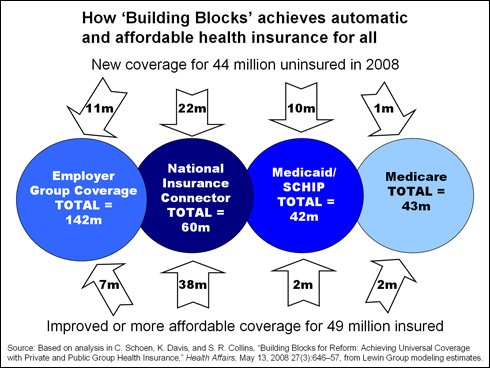One of the major objections to proposals for universal health insurance coverage is that they would require a radical restructuring of the current system of coverage in the U.S.—forcing Americans who are perfectly content with their health plan to enroll in a one-size-fits-all government program.
That's why a new health reform proposal developed by researchers at The Commonwealth Fund holds considerable promise as a practical framework for achieving universal health coverage while containing health care costs. As described in a recent Health Affairs article and Fund issue brief, the "Building Blocks" approach is designed to cover 44 million of the estimated 48 million uninsured Americans in 2008 and lower overall health spending—without creating major disruptions to Americans who are satisfied with their current health plan.
Conceived by the Fund's Karen Davis, Cathy Schoen, and Sara R. Collins, the Building Blocks framework would preserve employer-sponsored health insurance, Medicaid, and the State Children's Health Insurance Program (SCHIP) while expanding and improving Medicare—one of the most popular and successful public programs in history. In addition, small businesses, the self-employed, and everyone else lacking access to group coverage would have a choice of an enhanced Medicare plan or private health plans in which they could enroll through a health insurance "connector."

"Most workers and retirees with coverage do not want it 'messed with'—they just want to be assured that they will have it," said Dallas Salisbury, president and CEO of the Employee Benefit Research Institute. "Thus, moving to universal coverage is most likely to be politically acceptable if it builds on current programs."
The proposal's specifics include:
- A new Medicare option—"Medicare Extra"—that would be open to everyone and would offer enhanced benefits as well as premiums 30 percent lower than the average premiums currently charged to employers.
- A national insurance connector through which individuals and small businesses would have a choice of private plans or the new Medicare Extra plan.
- A requirement that all applicants be given health insurance at standardized rates, regardless of their health status.
- Tax credits to make sure premiums are affordable.
- Expansion of Medicaid and SCHIP to cover all low-income adults and children below 150 percent of the federal poverty level, with modest copayments and no premiums.
- A requirement that everyone enroll in a health plan; uninsured individuals who file taxes would be automatically enrolled.
- A mandate that employers either provide health insurance or pay 7 percent of payroll (up to $1.25 an hour) into a pool to help to finance coverage.
- Medicare reforms that would extend Medicare Extra benefits to current Medicare beneficiaries, eliminate Medicare's two-year waiting period for the disabled, and allow adults ages 60 to 64 to buy in to Medicare.
Estimates prepared by the Lewin Group show the expansion would have a negligible effect on total national health spending. That's because of offsetting savings on administrative and other costs, which would limit the plan's financial impact to a net increase of $15 billion, or less than 1 percent of estimated total health spending for 2008. Moreover, if combined with a series of health care reforms—among them, widespread adoption of electronic information systems and evidence-based medicine, a revamping of Medicare's system for paying hospitals and physicians, and negotiation of prescription drug prices—Building Blocks would yield savings of $1.6 trillion in national health spending over 10 years.
"This approach builds on group insurance coverage and the national reach of Medicare and at the same time addresses the high administrative and premium costs for individuals and small groups," says Fund president Karen Davis. "It also demonstrates that it is possible to buy more for our health care dollars, cover all Americans with high quality insurance, and institute real reforms to stem rising health care costs."